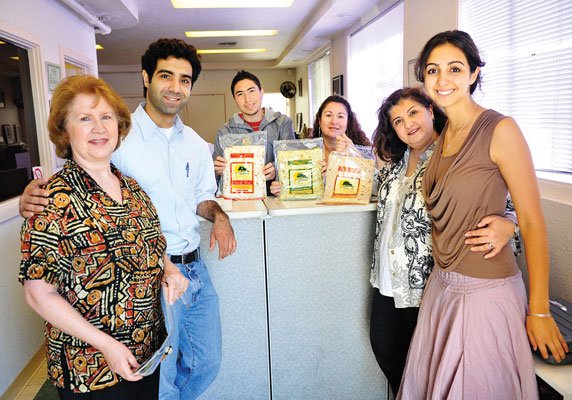If you purchase a bag of California Lavash from the local
Safeway and later find yourself marveling at the flatbread’s fluffy
composition, simplistic goodness and straight-from-the-oven
freshness, it may not come as a surprise: This standup addition to
the Garlic Capital’s roster of
”
made in Gilroy
”
novelties was baked less than a few miles away.
If you purchase a bag of California Lavash from the local Safeway and later find yourself marveling at the flatbread’s fluffy composition, simplistic goodness and straight-from-the-oven freshness, it may not come as a surprise: This standup addition to the Garlic Capital’s roster of “made in Gilroy” novelties was baked less than a few miles away.
Milias Restaurant on the corner of Monterey and Sixth streets serves the Afghan Noor with its dips. Mr. Falafel in Morgan Hill flies through about 1,200 of the original flour wraps in a week. And the Gilroy Garlic Festival’s latest addition to Gourmet Alley – the Surf & Turf Festival Wrap – comes enveloped in the flavorful garlic-infused Pizza Lavash.
“Whatever you put in it, the simplicity of this product allows those flavors to come out. The bread itself is a palate; an empty canvas,” said Rosette Eshoo, the personable matriarch of the family-run business that’s been around for the better part of two decades.
Previously located in Morgan Hill, California Lavash moved its production facilities four years ago to 101 Leavesley Road. Its distribution spans the Bay Area, showing up in specialty grocery stores, a falafel stand in Santana Row and major chains like Whole Foods and Safeway.
Coining their vocation as “baking age-old bread for a modern, health conscious consumer,” Eshoo maintained their tight-knit company is still a “ma and pa” enterprise that relishes a modest profile – in spite of a promising trajectory that could one day see their brand go national.
“That place is the best bread company known to man. They made me be able to revolutionize the falafel sandwich,” said Art Nazzal, owner of Mr. Falafel who bucked tradition by swapping pita bread for lavash, as it’s “less messy, very tasty and very healthy.”
Categorized as a Middle Eastern flatbread, lavash’s anatomy is noticeably different than tortillas and pitas. Rectangular in shape with rounded corners, its origins trace back thousands of years according to the Eshoos, who view the lavash’s unsullied nutrition content and malleable versatility as desirable selling points in the 21st century.
Strong, pliable, fluffy and soft, the stuff is like the Swiss army knife of bread products. It fulfills copious possibilities, including rollups, wraps, chips, pizza, edible dip bowls, quiche, hors d’oeuvres, crackers, grilled cheese sandwiches or crispy wedges for dunking – all with the perk of a lean composition: The spinach wrap, for example, has zero sugar, zero fat, zero cholesterol and 60 calories for an 8-by-10 inch sheet.
“I saw a young man in Whole Foods pick up one of our products and read the whole thing very carefully,” recalled Eshoo, remarking on the fact consumers have begun to scrutinize more closely what goes into their food.
Unlike California Lavash, she said other flatbreads hitting the market have longer, more complicated ingredient lists.
“It’s just scary.”
In light of products that read “heart healthy” on the front, Eshoo pointed out sometimes “the story on the front is not the story that’s being told in the ingredient list.”
The entire lineup of vegan, certified Kosher, California Lavash varieties includes the Original, Whole Grain and Spinach Wraps, plus a California Pizza Lavash infused with Gilroy garlic, olive oil and soy oil. California Lavash also creates two artisan breads, a Persian-style flatbread called Sesame Sangak, and a pillowy Afghan Noor, which comes in white or whole wheat, and is made with black caraway and sesame seeds and is hand-stretched.
Expressing an appreciation for California’s open-mindedness toward culinary “fusions,” the Eshoos are in step with the region’s penchant for buying local, staying healthy and eating wholesome.
“We bring all that to flatbreads,” said Rosette, an Assyrian who emigrated with her parents from Iran in the ’70s.
With a “waste not” mentality, California Lavash is also something of a model company. Rather than throw away excess product, the business donates bread to faith-based and community organizations, with the remainder picked up by area farmers who use it for livestock feed.
Reflecting on this, Eshoo remarked “we’re floored by what we make here feeds so many people.”
While six out of 25 California Lavash employees are blood-related, Eshoo likened all of them to family. She mentioned staff will often refer to the product as “my lavash” this, “my lavash” that.
Rising from her chair, she showed off a door plastered with photographs, notes and drawings from children and relatives, a cheerful collage that “reminds us why we’re working.”
Even with the door closed, her workspace is filled with a wafting smell of home-baked bread – a delicious aroma Rosette, her husband Renee, daughter Lilea and son Rick are privy to smelling on a day-to-day basis as their administrative offices are adjacent to baking and packaging facilities. Their business is wholesale with no retail location, however Lilea and Rick are in the midst of building an online store.
Regarding California as “an amazing place” where global cuisines converge, Rosette said California Lavash recipes draw from ancestral origins but “a lot of different influences” contributed to the final product.
“Many decades ago, simple food was taken and converted into this thing that looks like the original food, but has none of the attributes,” Rosette observed.
Food has become industrialized, she said, “but it doesn’t need to be like that.”














